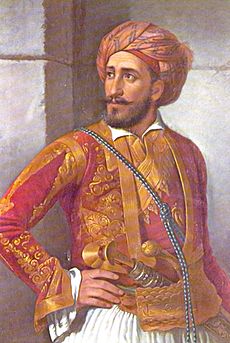Also known as:
Giannis Makrigiannis, Ioannis Makrigiannis, Ιωάννης Μακρυγιάννης
More People of Greece
More Topic Categories
Related Destinations
Yannis Makriyannis (01/1797 - 1864)
 Yannis Makriyannis was a hero of the Greek War of Independence of 1821, an army officer and politician after the creation of the New Greek State.
Yannis Makriyannis was a hero of the Greek War of Independence of 1821, an army officer and politician after the creation of the New Greek State.He was born in 1797 in a town of the Fokida prefecture. His father was killed at a conflict with the Turks when Makriyannis was just one year old. When he was four, his family was forced to leave the town and move to Livadia, after a raid by the Turks. In 1811, he was hired by the secretary of Ali Pasha, and he moved to Arta and Ioannina. Six years later, he started working as a merchant and grew a considerable fortune through that. In 1820, he became a member of the secret society Filiki Etaireia, which was responsible for the preparations of the Greek Revolution; thus, he was sent to Patra in order to help at the preparations there.
During the Revolution, he was very active militarily and fought with courage, passion, prudence and foresight. He had many battle wounds; in fact, at the battle of Athens near Acropolis, he was shot thrice on the same night, defending a fellow soldier. He was particularly fond of using guerilla tactics, in order to deceive and defeat his enemies. Despite being a person who received virtually no education, his patriotism and genius contributed immensely in the cause for Greek independence, particularly as he managed to keep Greeks united in very dangerous periods. As a result, he earned the respect and trust of the greatest officers and politicians during the Revolution.
Whenever the temporary governments that were formed during the Revolution offered him any kind of fortune, small or large, he refused to take it in the name of freedom and the country. Due to his selflessness, he built bonds of trust with many people. After the end of the Revolution, he started writing his Memoirs (being self – taught) which comprise a very important, unique and invaluable historical source. He came in direct conflict with the supporters of Ioannis Kapodistrias, the first governor of Greece, and later Otto, the first King of Greece. He actively participated in the Revolution of 3 September 1843. In 1852, he was arrested, charged with conspiring to murder King Otto, but he was set free in 1854. In 1864, he received the rank of lieutenant general and died shortly afterwards.
According to some scholars, he was a controversial figure as he went in conflict with his comrades for purely financial reasons and the allocation of lots in Athens. He was also characterized as a money grabber by some, because he may have been involved in the wasteful management of the Greek debts.
See Also:
 Athens Photos
Athens Photos
 Santorini Photos
Santorini Photos
 Crete Photos
Crete Photos
 Meteora Photos
Meteora Photos
 Corfu Photos
Corfu Photos






